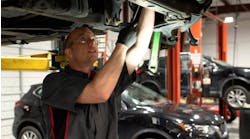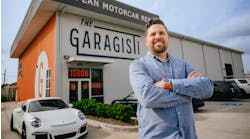To turn around a struggling “old-boys” shop with antiquated processes (or, in some cases, no processes at all) Joe Weigt took over management of the 10-bay Mr. Mobile Lube shop from his father in 2011.
He quickly implemented a dramatic turnaround plan that included different technician pay plans and new processes to improve customer service. Weigt’s changes resulted in a full-scale mutiny where three quarters of the staff quit, leaving the then-27-year-old to run the shop with a skeleton crew while rebuilding the staff and company culture.
Three years later, the business has more than doubled its sales, while focusing on expanding to a second location, reintroducing mobile service and growing its fleet partners, which already account for more than 60 percent of the business.
At this point, I’ve made so many changes that I’ve almost hired myself out of a job. These days, I spend a lot of time talking to our service advisors, looking at the numbers to make sure we’re making money and follow-ups with our big fleet accounts. I want to focus on business development, and getting more accounts.
I’m evolving, and trying to get more people involved and taking ownership in this business. I want people to have an incentive to come into work other than just a paycheck. I went back to a hybrid-flat rate system and that at first was really nerve wracking for the technicians, but this last pay period they all made more on this new system, so I think they’re all starting to buy into it and realize I’m not just throwing these things out there, that there is legitimacy to the stuff that I propose.
I honestly don’t have an average day because of my position. I spend a lot of time researching training for the guys, while also doing some fill-in service advising for an advisor I had to let go.
I study a lot of what other businesses do, not necessarily my competitors in the auto industry, but other businesses in general. Running a business is somewhat universal—it just depends on what industry you’re in. I spend a lot of time reading, researching and trying to absorb as much information as I can to make me a better leader. It’s a different approach.
My dad, Kim, bought the business in 1998 and, at the time, it was a brick and mortar business with four trucks in severe disrepair. After he bought it, the mobile portion of the business faded out, because customers didn’t want to pay for the cost of mobile service. They expected more of a shadetree mechanic feel, with lower prices that were too hard to justify.
It was hard for my dad to turn over the business at first, but now he gives me free reign. He was worried I would run it into the ground, but I did the opposite. I’m sure it’s hard to hand over something you’ve put your blood, sweat and tears into. Because he still owns 70 percent of the business, I consult him on big decisions—he’s been doing this a lot longer than I have.
He’s a fly-by-the-seat-of-his-pants guy, where as I’m very calculated. I’m a numbers guy, and like to see measurables and metrics so I can determine what is going to work out and make us money.
When I first came on as a janitor in 2001, this was an old-boys shop. I became a service advisor in 2006. A lot of the guys didn’t like me being detail oriented, and I got constant pushback. It was tough at first, because we were getting customer complaints due to the quality of work. Guys were trying to bang things out, and partially because they were on flat rate, they didn’t care if the customer had a good experience or not. Guys were cutting each other’s throats for work, and fingerprints and footprints were left on the vehicles—stupid stuff that shouldn’t happen.
We had some incremental increases in sales and I implemented a lot of technology and security features, and really tried to become more customer oriented and explain things to the customers. We didn’t see explosive sales increases until I was promoted in 2011.
Right out of the gate, I implemented an inspection process, started using seat covers and floor mats and changed the guys to hourly. I had a full-scale mutiny, everybody quit on me. They didn’t want to work for somebody with less experience than they had, and they didn’t like all the policies I was implementing. They also thought I was going to run the business into the ground.
I was angry and scared. I had worked with these guys for so long, and built relationships with them that I thought extended beyond the business. I thought, “What am I going to do?”
I ended up hiring the first people that came along just to survive, and it was a mistake. He was an ASE master-level tech who forgot to clip on some oil cooler lines and put oil in the motor. I went through some turnover that first year, and a few more techs trying to find people that fit the culture that I wanted to build going forward.
It took a while to get my current staff assembled. In the meantime, I was working 15 hours a day for a year or two. I really started focusing on personality, who was going to fit what I wanted to accomplish. I figured as long as they have the aptitude, we could train them. I got lucky and found a couple of decent techs who were moving to the area, and I was able to hire them on.
By changing our culture and improving our inspections, we were able to double our sales that first year.
Since then, we have switched the pay system again. It’s a hybrid plan with a guaranteed base and a flat rate on top of that. Some of the guys were concerned about their finances, but I assured them that we had enough business for that to happen—they just had to work hard and stay moving.
When we moved to hourly, we saw production losses and some jobs that should have been turning quicker. However, our warranty issues all went away, beyond parts failures that are out of our control. I wanted the guys to have an incentive, especially the ones that do the lion’s share of the work. It’s a team effort: either we all make money or none of us do.
Fleets are 61 percent of our business. We’re good at retail, too, but it’s a different mindset. Sometimes it’s hard for us to switch gears to the retail side. With our fleet customers, time is money. We’ve got to turn their vehicles as quickly as possible, so they can get their guys back on the road and making money.
Our fleet customers get priority service, where we drop what we’re doing when they have issues. Some of our retail customers didn’t understand this in the past, back when there was only one or two of us. Now we’re staffed appropriately so we can meet the needs of both. We usually have three or four technicians on at any given time.
We also offer our fleet customers 24/7 roadside assistance. Shortly after I took over management, it was just me handling the calls. There was a month where I would get home at 11, fall asleep on the couch and my phone would ring at two or three in the morning with a truck that froze up and wouldn’t start. It was nonstop. I would take care of the problem, then get another hour of sleep and go back into work—it was brutal.
I had to make changes, and started getting the staff involved on roadside calls. Our inspections also resulted in less breakdowns, and we don’t get as many of those calls. We make money on breakdowns, but nobody likes to do them. I’d rather be at home with my family than out on the side of the road somewhere.
We’re actively looking for another shop, and have put a couple of offers in on locations that didn’t quite work out. We’re also looking at reincorporating a mobile service component to the business, because we’ve had a lot of customers tell us it would be cool if we did that again—and they’d be willing to pay for it. It won’t be a huge change in our business. We also might offer roadside assistance to some of our retail customers.
Getting back into mobile service would help eliminate confusion over our name, people thinking we’re a mobile company. It’s like, “No, we actually have a brick-and-mortar facility.” I’m going to approach our fleet customers and their employees as a means of testing this—I’m not going to just test it on unknown customers, but people who already know us.
I want to open multiple locations, potentially even franchise, to spread our footprint throughout the Treasure Valley and beyond.



